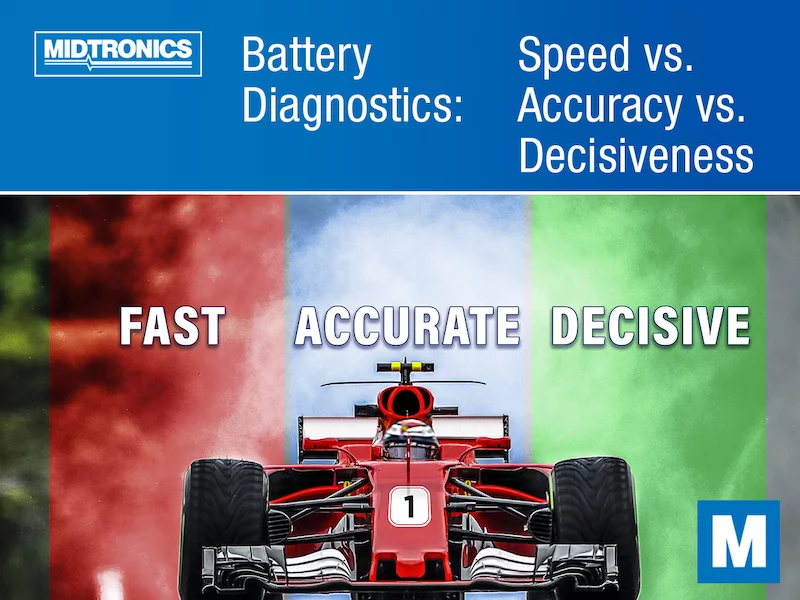In an ever-changing automotive industry, efficient and accurate battery diagnostics are crucial to ensure customer satisfaction and reduce time spent diagnosing issues. As the demand for battery-related services increases, technicians must balance getting the job done quickly, getting diagnostics completed accurately, and a clear result to provide the best possible results.
Striking this balance requires an understanding of the unique challenges facing battery diagnostics and the ability to navigate these challenges effectively. In this blog post, we will discuss the importance of speed, accuracy, and decisiveness in battery diagnostics and explore how to optimize their use.
What Components of Battery Testing Are Important to You?
Whether you’re aware of it or not, every battery test your shop performs is affected in some way by these three factors. The only question? How much weight is placed on each of them. In the end, it affects whether you’ll be trusted by the customer in the future, not to mention if you’ll earn their business on the current visit.
Speed
In an industry where time is money, fast and efficient diagnostics are essential. Battery tests that are performed on every vehicle that passes into the shop take time, and minimizing that investment on vehicles without a customer complaint is key. Under 2-3 minutes per vehicle is ideal, from setup to results.
But when there’s a customer concern, it’s just as important for efficient time use. Of course, a thorough diagnosis is what’s necessary, but a customer is likely unwilling to wait a whole day for a perceived ‘simple’ battery issue. A test should be relatively quick to identify a cause for concern – under 30 minutes, ideally – that can then be followed up with a more complete diagnostic process by a technician.
Accuracy
However, speed without accuracy can have disastrous results, either missing a failing battery or replacing a suspect battery unnecessarily. But sometimes accuracy can require more time spent diagnosing the battery.
For example, a quick battery test in the service drive might come up with ‘Charge and Retest’ as the result. The test result is essentially saying that the battery’s charge is too low to accurately diagnose with a handheld battery tester. This result is viewed as indesicive, as it is not stating whether the battery is good or bad. It is simply stating that it needs charging prior to accurate diagnosis.
Decisiveness
Decisiveness in battery testing refers to the likelihood the tester will render a diagnosis, as opposed to a result like “Charge and Retest”. Decisiveness in a battery tester is often noticeable. Everybody wants a tester to render a decision every time, because charging batteries takes time. But it’s important that decisiveness is balanced with accuracy. Providing incorrect diagnoses to customers hurts service quality and customer trust.
How Do These Factors Impact Your Business?
It is important that you are evaluating the battery testing technologies available, understand the trade-offs they provide in speed vs accuracy vs decisiveness, and match that up to your business model. For example, cars that drive in for oil changes often have batteries with enough charge to quickly and accurately diagnose them with a conductance based handheld. On the other hand, customers complaining of power related issues, may be more likely to have discharged batteries. In these instances you may need more decisive devices like diagnostic chargers take a little longer to accurately diagnose the battery.
At the end of the day, speed will be important to some diagnostic situations while others are going to be more focused on accuracy, and decisiveness is just as key to others. Equip your shop with battery diagnostic equipment that can cover all of your bases so you can better serve your customers and earn more business.




